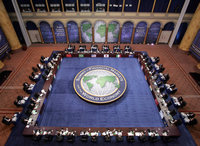After two days of high-profile meetings and deliberation last week, the G-20 managed to make official something everyone already knew: the United States and Europe can no longer effectively manage the whims of the global economy on their own. To that end, the group reached consensus on two major fronts: 1) the more diverse G-20 should effectively replace the Western-dominated G-8 as the world's primary economic coordinating body; and, 2) voting power within the IMF should be reformed to give greater voice to emerging powers.
Stop the presses, right? Yes and no. This is big news, but not necessarily new news.
Let's first look at the new role for the G-20. If one takes the long view, this can be spun as a big deal. The advanced industrial economies have finally invited the world's rising powers to the grown-ups' table -- and not just for a one-time-only "crisis" banquet, but seemingly for good. For the emerging economies, this recognition is long overdue. However, they don't have Western heads of state to thank for their newfound status so much as the irresponsible Western bankers who played a major role in causing the financial crisis. Without the palpable sense of urgency created by the crisis, there is little doubt that the West's new "inclusive" tone would never have emerged.

